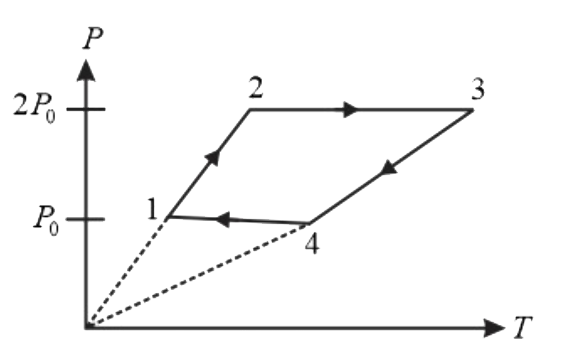One mole of an ideal monoatomic gas is initially at 300K. Find the final temperature if 200J of heat are added as follows:
(a) at constant volume (b) at constant pressure.
The correct Answer is:A, B, C
To solve the problem, we need to find the final temperature of one mole of an ideal monoatomic gas after adding 200 J of heat under two different conditions: at constant volume and at constant pressure.
(a) At Constant Volume
1. Identify the formula for heat added at constant volume:
The heat added at constant volume is given by the equation:
Q=nCVΔT
where:
- Q is the heat added (200 J),
- n is the number of moles (1 mole),
- CV is the molar heat capacity at constant volume for a monoatomic gas, which is 32R,
- ΔT is the change in temperature.
2. Substitute known values:
The value of the gas constant R is approximately 8.31J/(mol K). Thus, we can calculate CV:
CV=32R=32×8.31=12.465J/(mol K)
3. Set up the equation:
Now we can substitute the values into the heat equation:
200=1×12.465×(Tf−300)
4. Solve for Tf:
Rearranging the equation gives:
Tf−300=20012.465
Tf−300=16.04
Tf=316.04K
(b) At Constant Pressure
1. Identify the formula for heat added at constant pressure:
The heat added at constant pressure is given by:
Q=nCPΔT
where:
- CP is the molar heat capacity at constant pressure for a monoatomic gas, which is 52R.
2. Calculate CP:
CP=52R=52×8.31=20.825J/(mol K)
3. Set up the equation:
Substitute the values into the heat equation:
200=1×20.825×(Tf−300)
4. Solve for Tf:
Rearranging gives:
Tf−300=20020.825
Tf−300=9.61
Tf=309.61K
Final Results
- (a) Final temperature at constant volume: 316.04 K
- (b) Final temperature at constant pressure: 309.61 K
The heat added at constant volume is given by the equation:
Q=nCVΔT
where:
- Q is the heat added (200 J),
- n is the number of moles (1 mole),
- CV is the molar heat capacity at constant volume for a monoatomic gas, which is 32R,
- ΔT is the change in temperature.
The value of the gas constant R is approximately 8.31J/(mol K). Thus, we can calculate CV:
CV=32R=32×8.31=12.465J/(mol K)
Now we can substitute the values into the heat equation:
200=1×12.465×(Tf−300)
Rearranging the equation gives:
Tf−300=20012.465
Tf−300=16.04
Tf=316.04K
The heat added at constant pressure is given by:
Q=nCPΔT
where:
- CP is the molar heat capacity at constant pressure for a monoatomic gas, which is 52R.
CP=52R=52×8.31=20.825J/(mol K)
Substitute the values into the heat equation:
200=1×20.825×(Tf−300)
Rearranging gives:
Tf−300=20020.825
Tf−300=9.61
Tf=309.61K
- (a) Final temperature at constant volume: 316.04 K
- (b) Final temperature at constant pressure: 309.61 K
Topper's Solved these Questions
- LAWS OF THERMODYNAMICSBOOK - DC PANDEY ENGLISHCHAPTER - LAWS OF THERMODYNAMICSEXERCISE - Exercise 21.4
8 Videos
- LAWS OF THERMODYNAMICSBOOK - DC PANDEY ENGLISHCHAPTER - LAWS OF THERMODYNAMICSEXERCISE - Level 1 Assertion And Reason
10 Videos
- LAWS OF THERMODYNAMICSBOOK - DC PANDEY ENGLISHCHAPTER - LAWS OF THERMODYNAMICSEXERCISE - Exercise 21.2
7 Videos
- LAWS OF MOTIONBOOK - DC PANDEY ENGLISHCHAPTER - LAWS OF MOTIONEXERCISE - Medical entrances gallery
39 Videos
- MAGNETIC EFFECT OF CURRENT AND MAGNETISMBOOK - DC PANDEY ENGLISHCHAPTER - MAGNETIC EFFECT OF CURRENT AND MAGNETISMEXERCISE - Integer type Questions
10 Videos
Similar Questions
One mole of an ideal monoatomic gas requires 207 J heat to raise the temperature by 10 K when heated at constant pressure. If the same gas is heated at constant volume to raise the temperature by the same 10 K, the heat required is [Given the gas constant R = 8.3 J/ mol. K]
View SolutionOne mole of an ideal monoatomic gas is mixed with one mole of an ideal diatomic gas. The molar specific heat of the mixture at constant volume is (in Calories )
View SolutionOne mole of an ideal monoatomic gas is taken at a temperature of 300K. Its volume is doubled keeping its pressure constant. Find the change in internal energy.
View SolutionOne mole of an ideal monoatomic gas expands isothermally against constant external pressure of 1 atm from initial volume of 1l to a state where its final pressure becomes equal to external pressure. If initial temperature of gas is 300K then total entropy change of system in the above process is: [R =0.082L atm mol−1K−1=8.3Jmol−1K−1]
View SolutionOne mole of an ideal monoatomic gas expands isothermally against constant external pressure of 1atm from intial volume of 1L to a state where its final pressure becomes equal to external pressure. If initial temperature of gas in 300K then total entropy change of system in the above process is:
[R=0.0082Latmmol−1K−1=8.3Jmol−1K−1]
View SolutionOne mole of an ideal monoatomic gas undergoes a cyclic process, as shown in the figure. If the temperature of the gas at state 1 is 300 K and at state 4 is 500 K, then heat exchanged during process 2→3, is

View SolutionAn ideal monoatomic gas at 300K expands adiabatically to twice its volume. What is the final temperature?
View SolutionFive moles of an ideal monoatomic gas with an initial temperature of 127∘C expand and in the process absorb 1200J of heat and do 2100J of work. What is the final temperature of the gas?
View SolutionGraph for specific heat at constant volume for a monoatomic gas
View SolutionGraph for specific heat at constant volume for a monoatomic gas
View Solution
